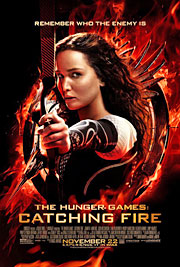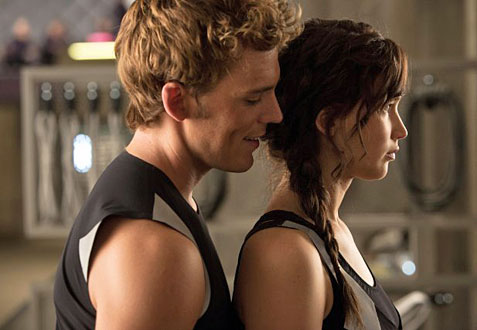Movie Review: “The Hunger Games: Catching Fire”

As far as book sequels go, “Catching Fire” isn’t exactly the most original. It’s like the “Evil Dead 2” of YA literature – a sort of ‘take two’ on the first novel that’s bigger and better, but not profoundly different. My lukewarm reaction to the second installment in Suzanne Collins’ “Hunger Games” trilogy is almost completely due to that reason alone, because the concept feels more like a lazy rehash than a continuation of the story, although curiously, that isn’t the case with the film adaptation. Under the assured direction of Francis Lawrence (stepping in for the departing Gary Ross), “Catching Fire” doesn’t just improve upon Collins’ book, but the first movie as well.
After returning home as joint victor of the 74th Hunger Games, Katniss Everdeen (Jennifer Lawrence) finds it difficult readapting to her life in District 12, haunted by the events that took place inside the Arena. While on a victory tour across Panem, Katniss witnesses the unrest that’s begun to spread across the districts as a result of her highly publicized stunt, and recognizing the danger that a potential rebellion poses, President Snow (Donald Sutherland) enlists the help of Head Gamemaker Plutarch Heavensbee (Philip Seymour Hoffman) to devise a plan to eliminate Katniss once and for all. So when it comes time for the 75th edition of the Games (a quarter century celebration that adds a special twist to the normal rules), Snow announces that this year’s tributes will be selected from the pool of previous victors. As the only female survivor from District 12, Katniss is forced to participate in the Hunger Games once again along with Peeta (Josh Hutcherson), who volunteers in place of Haymitch (Woody Harrelson), only to discover that they have some unlikely allies watching their backs.
Though the narrative shares some obvious similarities with the three-act structure of the first movie, “Catching Fire” is superior in just about every way, including stronger, emotionally-charged performances from Lawrence and Hutcherson and better character development for the other tributes, who are more than just numbers and faces this time around. Francis Lawrence has also added to the already impressive cast with actors like Hoffman, Jeffrey Wright, Amanda Plummer and Jena Malone, and not only do they help keep things fresh, but they add a whole new dynamic to the story. Some of the returning characters suffer as a result (namely Liam Hemsworth’s Gale, who gets the short end of the stick yet again), but others step up in their place. Sam Claflin, in particular, is the film’s biggest standout. Though he’s failed to impress in his previous big budget outings (see: “Pirates of the Caribbean: On Stranger Tides” and “Snow White and the Huntsman”), he’s perfectly cast here as Finnick Odair, the cocksure pretty boy with more to him than meets the eye.
In addition to all the great talent on display, the movie feels much larger in scope, and this is where Lawrence’s contributions are most notable. Gary Ross did a solid job crafting the cinematic world of Collins’ novels, but “The Hunger Games” was lacking in certain areas, particularly the action sequences and visual effects. Lawrence has more experience working on big movies like this (not to mention nearly double the budget), so it’s no surprise that the film looks as good as it does. The script by Oscar-winning screenwriters Simon Beaufoy and Michael Arndt is also crucial to the movie’s success, removing a lot of the unnecessary filler while raising the stakes to create a smarter and more focused adaptation that’s extremely well-paced for its 146 minute runtime. Though the finale is left just as open-ended as in the book (which may be a sore point for viewers unfamiliar with the source material), “Catching Fire” is everything you could want from a sequel without many of the usual failings.
















